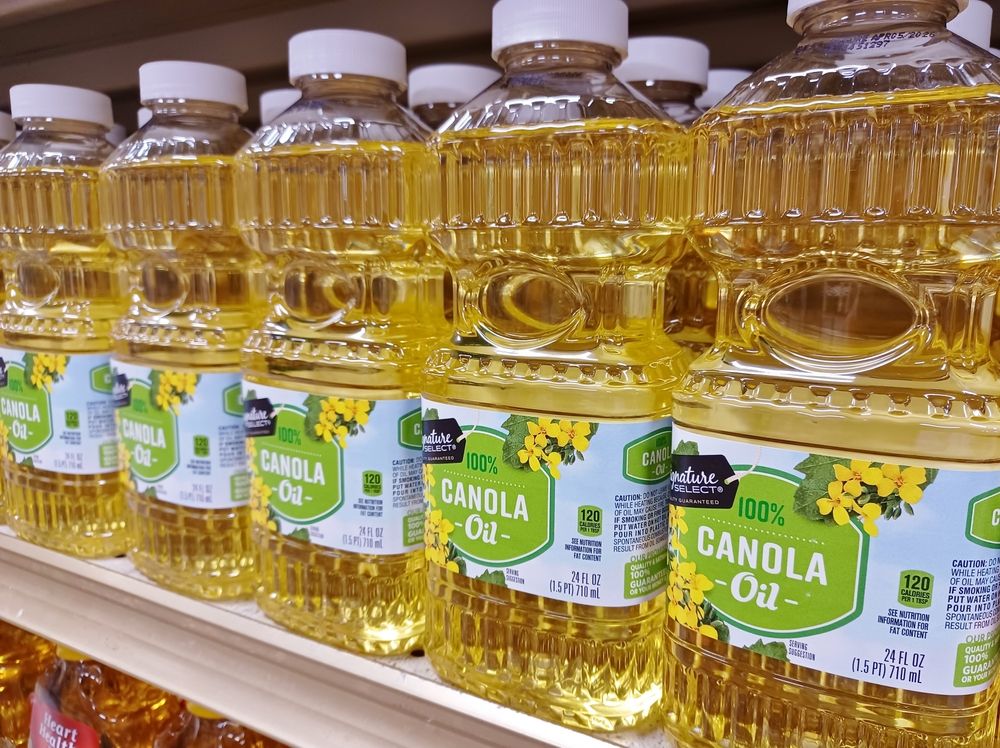
Whether you’re baking, roasting vegetables, or pan-frying chicken, oil is a kitchen essential you’ll always want to keep on hand. If you follow recipes closely, you’ve likely noticed that canola or vegetable oil is commonly recommended. While they might look and smell nearly the same, are they truly that similar? And when it comes to the health debate between canola and vegetable oil, which one comes out on top?
Both canola and vegetable oils are popular choices for everything from baking cookies to frying fish, but there are some important differences in how they’re used, their nutritional value, and their potential impact on health. To help you make the best choice, we’ve broken down the key differences, health benefits, and important considerations to keep in mind the next time you’re shopping in the oil aisle.
How Canola and Vegetable Oil Are Made

Here’s a rewritten version of the section:
One of the key distinctions between canola oil and vegetable oil lies in their origins and how they’re produced.
Canola oil is derived from the seeds of the canola plant, which produces bright yellow flowers and pods filled with oil-rich black seeds. Although canola plants were initially bred from rapeseed, a crop used for industrial oil, canola oil has unique properties. To be classified as canola oil, it must contain less than 2% erucic acid—a fatty acid that has been associated with potential heart health risks. The extraction process typically involves heat and chemical solvents, though "cold-pressed" varieties, which avoid heat during processing, are also available.
Vegetable oil, on the other hand, can be extracted from a variety of seeds and plants. Oils like canola, soybean, avocado, olive, and sunflower are all considered vegetable oils. When you buy a bottle labeled "vegetable oil," it’s most commonly made from 100% soybean oil, although it may also be a blend of different plant oils. The oil is extracted using pressure, heat, and chemical solvents, followed by extensive refining to remove impurities, ensuring it’s safe for consumption.
Nutritional Comparison of Both Oils
Here’s a look at how canola oil and vegetable oil (typically soybean oil) compare nutritionally, according to the USDA Nutritional Food Database:
Canola Oil

Nutrition (Per 1 tbsp):
Calories: 124
Total Fat: 14 g
Saturated Fat: 1 g
Monounsaturated Fat: 9 g
Polyunsaturated Fat: 4 g
Vegetable Oil

Nutrition (Per 1 tbsp):
Calories: 120
Total Fat: 13.5 g
Saturated Fat: 2 g
Monounsaturated Fat: 3 g
Polyunsaturated Fat: 8 g
Health Benefits of Each Oil

While canola oil and vegetable oil have similar calorie counts and total fat content per serving, canola oil stands out for its more heart-friendly fatty acid profile, which may offer greater cardiovascular benefits. Vegetable oil, while also low in saturated fats, contains heart-protective properties and antioxidant-rich vitamins and minerals that support bone health.
Benefits of Canola Oil
Canola oil contains a mix of fats, but it is particularly high in monounsaturated fat (9 grams per tablespoon). According to a 2022 review in Missouri Medicine, replacing saturated fats with monounsaturated fats is associated with improved health outcomes, such as reduced body fat, lower body weight, and enhanced insulin sensitivity.
Although research on canola oil’s direct impact on heart health and metabolism remains inconclusive, a 2019 review in Advances in Nutrition found a small connection between canola oil consumption and modest weight loss. However, other studies have yielded mixed results regarding its clear benefits.
Additionally, one tablespoon of canola oil provides 16% of your daily recommended intake of vitamin E, an antioxidant that helps protect cells from oxidative stress caused by fat oxidation in the body.
Benefits of Vegetable Oil
Vegetable oil, commonly made from soybean oil, has a similar overall fat content as canola oil but is richer in polyunsaturated fats (8 grams per tablespoon), including small amounts of ALA, an omega-3 fatty acid, and a larger portion of omega-6 fatty acids.
Despite earlier concerns about the inflammatory potential of omega-6 fatty acids, a 2022 review in Nutrition found no clear evidence linking omega-6 fats to increased inflammation or oxidative stress. In fact, when used to replace saturated fats, omega-6s have been shown to lower blood cholesterol levels. Soybean oil is also a good source of plant sterols, which can further help reduce cholesterol.
One tablespoon of vegetable oil offers 21% of your daily value of vitamin K, an essential fat-soluble vitamin for blood clotting and bone health. Vitamin K plays a key role in bone calcification and may also prevent calcification in places like arteries, promoting overall cardiovascular health.
Are There Any Risks?

While both canola and vegetable oils can provide health benefits when used in moderation, there are a few reasons to be mindful of how much you incorporate into your cooking or store-bought foods.
Canola Oil Health Considerations
Like all fats, canola oil packs 9 calories per gram, which means it’s easy to consume more calories than needed if you’re not careful. While canola oil may help lower cholesterol when used to replace saturated fats, consuming too much fat, even from healthier sources, can still contribute to weight gain, increase the risk of heart disease, and potentially raise the likelihood of certain cancers.
Vegetable Oil Health Considerations
Although recent research no longer links omega-6 fatty acids directly to inflammation, consuming an excessive amount of them, especially compared to omega-3s, may not be ideal. A healthier approach is to balance your intake of fats by including more omega-3-rich foods in your diet.
Since vegetable oil, often derived from soybeans, is highly refined, it's generally safe for those with soy allergies because the refining process removes proteins. However, it's always best to consult your allergist to be sure. One point to consider is that phytoestrogens, compounds found in soybeans, can sometimes remain in the oil. In large amounts, these may affect hormone levels. Animal studies have suggested that excess soybean oil could indirectly increase testosterone, but the implications for humans are still unclear.
Taste & Cooking Properties

Both canola oil and vegetable oil have a neutral flavor, making them versatile choices for a wide range of cooking and baking without overshadowing the other ingredients in your dishes.
Cooking with Canola Oil
Canola oil’s very light, neutral taste allows it to be used in everything from baking cookies and sweet breads to pan-frying fish or roasting vegetables. It’s also a great option for marinades and salad dressings when you want the other flavors to shine through without interference from the oil.
Cooking with Vegetable Oil
Vegetable oil also has a neutral flavor, as the refining process removes much of the nutty taste from its soybean origins. Any remaining flavors are mild enough to complement most dishes. Vegetable oil is especially well-suited for baking, deep-frying, or roasting.
Canola Oil vs. Vegetable Oil: Which Is Healthier?

Both canola and vegetable oils offer advantages over oils high in saturated fats, but moderation is key when using them.
Canola oil is richer in omega-3 fatty acids, which can help reduce inflammation, and it’s also a better source of vitamin E, an antioxidant that helps combat oxidative stress. This makes canola oil a great option for supporting heart health and managing inflammation.
On the other hand, vegetable oil is high in plant sterols and vitamin K, which can aid in lowering cholesterol and promoting bone health. If your focus is on these specific health benefits, small amounts of vegetable oil may be the better choice.

